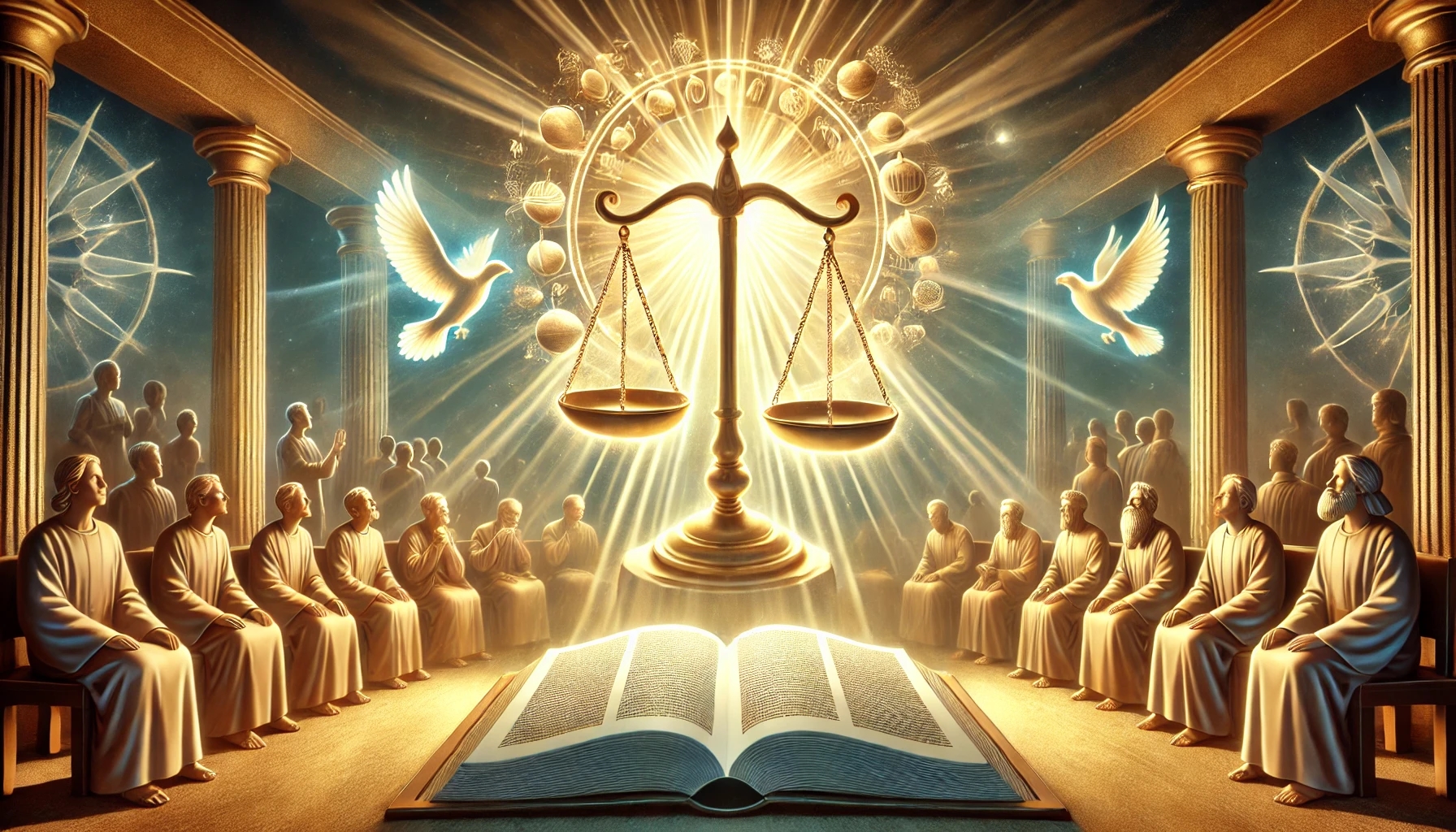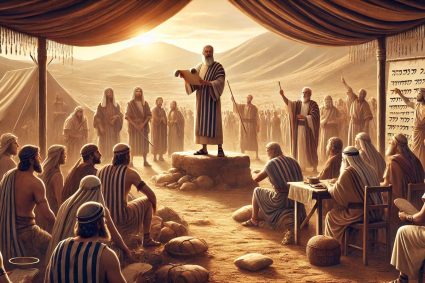
November 26, 2024
DAILY BIBLE READING – Romans Chapter 2
1 Therefore thou art inexcusable, O man, whosoever thou art that judgest: for wherein thou judgest another, thou condemnest thyself; for thou that judgest doest the same things.
2 But we are sure that the judgment of God is according to truth against them which commit such things.
3 And thinkest thou this, O man, that judgest them which do such things, and doest the same, that thou shalt escape the judgment of God?
4 Or despisest thou the riches of his goodness and forbearance and longsuffering; not knowing that the goodness of God leadeth thee to repentance?
5 But after thy hardness and impenitent heart treasurest up unto thyself wrath against the day of wrath and revelation of the righteous judgment of God;
6 Who will render to every man according to his deeds:
7 To them who by patient continuance in well doing seek for glory and honour and immortality, eternal life:
8 But unto them that are contentious, and do not obey the truth, but obey unrighteousness, indignation and wrath,
9 Tribulation and anguish, upon every soul of man that doeth evil, of the Jew first, and also of the Gentile;
0 But glory, honour, and peace, to every man that worketh good, to the Jew first, and also to the Gentile:
11 For there is no respect of persons with God.
12 For as many as have sinned without law shall also perish without law: and as many as have sinned in the law shall be judged by the law;
13 (For not the hearers of the law are just before God, but the doers of the law shall be justified.
14 For when the Gentiles, which have not the law, do by nature the things contained in the law, these, having not the law, are a law unto themselves:
15 Which shew the work of the law written in their hearts, their conscience also bearing witness, and their thoughts the mean while accusing or else excusing one another;)
16 In the day when God shall judge the secrets of men by Jesus Christ according to my gospel.
17 Behold, thou art called a Jew, and restest in the law, and makest thy boast of God,
18 And knowest his will, and approvest the things that are more excellent, being instructed out of the law;
19 And art confident that thou thyself art a guide of the blind, a light of them which are in darkness,
20 An instructor of the foolish, a teacher of babes, which hast the form of knowledge and of the truth in the law.
21 Thou therefore which teachest another, teachest thou not thyself? thou that preachest a man should not steal, dost thou steal?
22 Thou that sayest a man should not commit adultery, dost thou commit adultery? thou that abhorrest idols, dost thou commit sacrilege?
23 Thou that makest thy boast of the law, through breaking the law dishonourest thou God?
24 For the name of God is blasphemed among the Gentiles through you, as it is written.
25 For circumcision verily profiteth, if thou keep the law: but if thou be a breaker of the law, thy circumcision is made uncircumcision.
26 Therefore if the uncircumcision keep the righteousness of the law, shall not his uncircumcision be counted for circumcision?
27 And shall not uncircumcision which is by nature, if it fulfil the law, judge thee, who by the letter and circumcision dost transgress the law?
28 For he is not a Jew, which is one outwardly; neither is that circumcision, which is outward in the flesh:
29 But he is a Jew, which is one inwardly; and circumcision is that of the heart, in the spirit, and not in the letter; whose praise is not of men, but of God.
King James Version. Public Domain
Commentary
Introduction
Romans chapter 2 is a central passage in Paul’s letter that deals with the standard of divine judgment. This chapter addresses both Jews and Gentiles, confronting them with the reality that God’s judgment is impartial and just. Paul emphasizes that neither external affiliation nor knowledge of the law is sufficient for justification. Instead, it is the doing of the law that counts, reflecting an inner transformation. Romans 2 challenges us to examine our hearts and reflect on our relationship with God’s grace and truth.
Commentary
God’s Judgment is Impartial and Just (Verses 1–11): Paul begins with a sharp critique of those who judge others while committing the same sins themselves. He makes it clear that no one escapes God’s judgment through self-justification. God’s patience and goodness are meant to lead to repentance, but a hardened heart accumulates wrath for the day of judgment. Divine judgment is just and is based on each person’s actions, regardless of their origin.
The Law and Conscience (Verses 12–16): Paul explains that both those who know the law and those who live without it are accountable to God. Gentiles who do not possess the law but naturally fulfill its requirements demonstrate that the law is written on their hearts. Their conscience and thoughts will serve as witnesses on the day of judgment when God reveals the hidden things of people through Jesus Christ.
Warning to the Jews (Verses 17–24): Paul addresses the Jews directly, who rely on the law and their religious identity. He criticizes their hypocrisy: they teach others but fail to keep the law themselves. Their sins lead to the tarnishing of God’s name among the Gentiles. Paul emphasizes that external obedience alone does not create true righteousness before God.
The True Circumcision (Verses 25–29): Paul clarifies that external circumcision has no value if the law is not kept. True circumcision is of the heart, achieved by the Spirit and not by the letter. This inner transformation, which deserves God’s praise, is crucial for a genuine relationship with Him.
Summary
Romans chapter 2 outlines the standards of divine judgment: it is just, impartial, and based on people’s actions, regardless of their origin or external religiosity. Paul calls us to rely not on external traits or knowledge of the law but on an inner change of heart through God’s Spirit. He reminds us that true righteousness is achieved by living according to God’s will, not by mere appearances. This chapter challenges us to recognize our own hypocrisy and to allow God’s grace to transform us.
![]()

WEEKLY SPIRIT OF PROPHECY READING – Ellen White | The Desire of Ages
Chapter 77—In Pilate’s Judgment Hall
This chapter is based on Matthew 27:2, 11-31; Mark 15:1-20; Luke 23:1-25; John 18:28-40; John 19:1-16
Read online here
Commentary
Introduction
The chapter concerning Jesus’ trial before Pilate is a climax of the Gospels, where divine truth and human weakness collide. Pilate faces the challenge of choosing between justice and his own interests, while the Jewish leaders express their hatred through lies and manipulation. The story reveals profound lessons about power, hypocrisy, and the steadfastness of Christ.
Commentary
The Role of Pilate:
Pilate, the Roman governor, appears weak and indecisive, torn between his recognition of Jesus’ innocence and his desire to yield to the demands of the Jewish leaders. His inability to act according to his convictions leads not only to the condemnation of Christ but also to his own moral and political downfall. Pilate’s actions demonstrate how dangerous it is to sacrifice principles for personal gain.
The Attitude of Jesus:
Throughout the trial, Jesus remains calm and majestic. His silence speaks louder than words, and his behavior reflects his complete dedication to the divine plan. He offers Pilate the opportunity to recognize the truth, but Pilate misses the chance. Jesus’ patience and gentleness stand in stark contrast to the shouts of the priests and the crowd.
The Responsibility of the Jewish Leaders:
The priests and elders use lies and false accusations to impose their will. They shout, “His blood be on us and on our children!” (Matthew 27:25), without understanding the far-reaching consequences of their words. Their rejection of Christ places them and their people under a burden that reverberates through history.
Barabbas or Jesus:
The choice between Barabbas and Jesus is symbolic of the decision each person must make. Barabbas, a murderer and rebel, is preferred, while Jesus, the Savior, is rejected. This choice reflects the tragedy when people reject the truth in favor of what is wrong.
The Consequences:
Pilate tries to distance himself from the guilt by washing his hands in innocence, but his responsibility remains. The decision to condemn Christ becomes a turning point that forever changes human history. At the same time, the story shows the fulfillment of the divine plan to save the world through Jesus’ death.
Summary
The chapter concerning Jesus’ trial before Pilate reveals the deep abysses of human sin and the sublime greatness of divine grace. Pilate’s weakness, the hypocrisy of the Jewish leaders, and the choice of the crowd teach us that rejecting the truth has devastating consequences. However, Jesus stands firm as the embodiment of grace and truth, fulfilling the plan of redemption even in the face of betrayal and injustice. This chapter challenges us to courageously stand for the truth in our lives and to follow Jesus’ example of patience and dedication.
(Visited 12 times, 1 visits today)




















